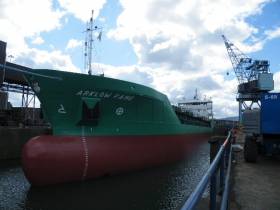Displaying items by tag: Dublin DryDock Closes
#ShippingReview - Jehan Ashmore reviews the shipping scene over the last fortnight.
Containership Antwerp called to Dublin on Maersk Group’s first direct call to the capital on a new Seago Line operated UK-Ireland-Spain service.
The ship is a sister of Maersk Alabama which Somali pirates hijacked in 2009. The story was made into a film 'Captain Phillips' played by actor Tom Hanks.
M.V. Ireland launched in the Netherlands, has no connections with the Irish shipping industry, however the newbuild is noteworthy given the vessel is one of the first dry cargoships to be powered by (LNG) liquefied natural gas.
All “shippers” as from July 2016 must declare to the carrier in advance the verified weight of packed containers.
Arklow Fame (90m) on Wednesday became the final ship to depart the country’s largest dry-dock (200m) in Dublin that officially closed yesterday. The unique strategic facility of Dublin Graving Docks Ltd had employed a skilled workforce of 26 at the Alexandra Basin site which is to be redeveloped.
The demise of the ship-repairer and engineering facility marks the end of a era in this chapter of the Irish maritime industry with the exception of Cork Dockyard, now the largest in the state.
The 2,998 tonnes Arklow Fame, one of the smaller vessels to use Dublin dry-dock, has since Thursday berthed at the Bulk Jetty within Alexandra Basin. Cargo transported by train from Boliden Tara Mines (ore for zinc and lead) was loaded on board the leadship of 10 'F' class Spanish built sisters.
The cargoship yesterday departed for Odda, Norway.





























































